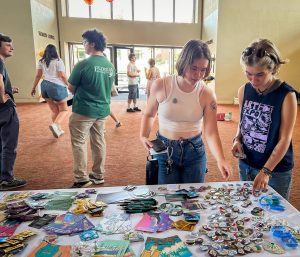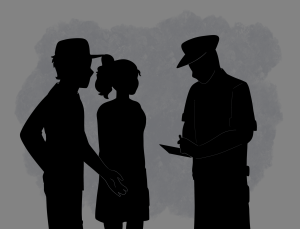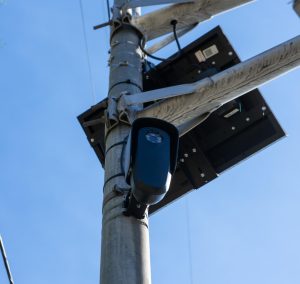Coronavirus prompts discussions on racism
February 13, 2020
The outbreak of a new strain of coronavirus has prompted Whitman students to discuss infectious diseases and xenophobia. The new strain, called novel coronavirus, originated in China and was first observed in late 2019.
For many, the uncertainty surrounding this outbreak of coronavirus has caused concern. While this strain of coronavirus is new, the virus as a whole is not and has previously caused outbreaks ranging in severity and mortality. Coronavirus was first discovered in humans in the 1960s, according to the Centers for Disease Control and Prevention. One of the most severe outbreaks of coronavirus in humans occurred in 2003 when approximately 8,000 people in 26 countries were infected, according to the World Health Organization.
“One of our biggest unknowns, and I think that is a real problem with [novel] coronavirus and any kind of new emerging infectious disease, is [that] people are uncomfortable with the uncertainty and the unknown,” Professor of BBMB James Russo said. “You get things about what the mortality rate is early on because you know certain numbers of deaths that can occur but you have no idea how many people have really been infected.”
The Whitman community members most burdened by the uncertainty surrounding this outbreak are those from China.
Junxi Chen, a sophomore student from Guangdong province in China, has had discussions with other international students from China enrolled at Whitman as well as other institutions about concerns over difficulties with returning to the U.S. because of limited flight options. Senior Tracy Cui said that she and other students from China have been frustrated that they can not do more to help those at home.
“Every morning we would wake up and there would be some news related to this thing,” Cui said. “We feel really vulnerable because we cannot do anything — kind of because we’re away from home — but at the same time, we’re thinking about what we can do for it.”
In response to this outbreak of novel coronavirus, the college has offered support to the Chinese international student community through the Intercultural Center.
“[The international student advisor] sent out an email to all of the students from China, like addressing this issue,” Cui said. “They mentioned that they can provide any kind of support, mentally, financially, whatever we need. I think that’s super cool and I felt really supported.”
However, that kind of support has not been felt by all people of East Asian descent in the U.S.. Chen said he has discussed concerns with friends from China about wearing face masks in public after reading a NBC News report about a Chinese woman who was attacked in New York for wearing one. NBC reports that the New York City Police Department is investigating the incident as a hate crime.
Chen pointed to news coverage and social media posts about coronavirus, saying that they perpetuated racist stereotypes about Chinese people as the cause for these alarming incidents.
“I am not offended by the concern [about coronavirus],” Chen said. “I am offended by the news that I see here.”
According to junior Zidane Galant-Laporte, a lot of the fear towards coronavirus is rooted in the fact that it originates in China.
“Mass media is portraying it as something that is Chinese made, it’s like the MSG of disease,” Galant-LaPorte said.
Monosodium glutamate, or MSG, is a flavor-enhancing additive that some link to a wide array of health problems, but there is limited evidence about its actual health effects. MSG is used in many processed foods, but it is most commonly negatively associated with Chinese takeout. Chinese food is often stereotyped as unclean and unsafe, reinforcing assumptions about MSG’s health risks.
“Those same stereotypes seem to be rising again in the wake of a serious outbreak that is claiming lives and preventing people from reaching their families,” Galant-Laporte said.
In response to news reports and content on social media that many perceive to have racist undertones, social media users from around the world have been pushing back online. In France, the hashtag “je ne suis pas un virus” has caused conversation about racist treatment of Asian people, according to NBC News. On social media platforms like Instagram and Twitter, many Whitman students have viewed memes and infographics about the racialized response to coronavirus.
“I’ve seen a lot of memes about the xenophobia surrounding coronavirus,” sophomore Allie McCann said.
Discussions of coronavirus have also taken place offline at Whitman, in both science and social science classes. Professors with specializations in health and disease have led discussions about the outbreak with students in the classroom.
Two professors teaching about novel coronavirus are Russo and Associate Professor of Sociology and Garrett Fellow Alissa Cordner. Novel coronavirus has proven to be a real time example of how new infectious diseases spread and public perception of them shapes the response.
During one of their meetings last week, Cordner’s “Sociology of Health and Illness” class discussed the difference in responses from the media and government to influenza and novel coronavirus. As of Wednesday, Feb. 5, there have been 12 confirmed cases of coronavirus with no known fatalities in the U.S. In contrast, a preliminary report from the Centers for Disease Control estimates that 10,000 to 25,000 people will die from influenza in the U.S. during the 2019-2020 flu season.
Both influenza and novel coronavirus are dangerous respiratory infections, especially for the elderly and those with pre-existing health conditions. They are also prevented in largely the same ways.
“When you have a virus like coronavirus, where the symptomatology is almost identical to influenza, the initial onsets of fever, and cough, and the respiratory disease — until you actually do a diagnostic test — it’s going to be very hard to distinguish it,” Russo said. “And maybe that will be a good thing, maybe we’ll see less influenza disease this year because people are on this heightened alert about infection control and isolation. If there’s any good thing that can come out of it, that’s a potential.”






